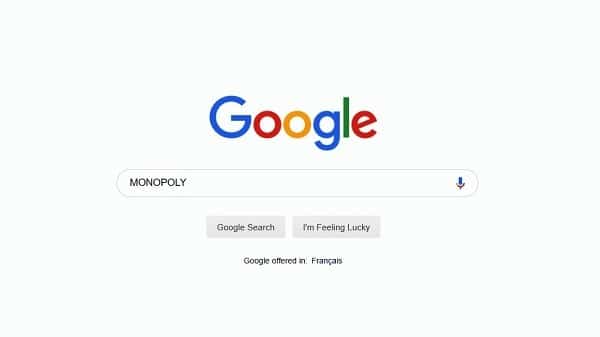
 Google. Monopoly? This investor thinks so.
Google. Monopoly? This investor thinks so.
Antitrust and competition issues could be a major headache for a number of big tech companies going forward.
But of the FAANG group of stocks currently under investigation it’s Google and parent company Alphabet (Alphabet Stock Quote, Chart, News NASDAQ:GOOGL) that has the most to worry about.
So says Geoff Lewis of Bedrock Capital who claims Google’s search engine amounts to a flat-out monopoly.
Reports emerged earlier this week that a group of US state attorneys general have combined powers to investigate Big Tech’s antitrust issues, with potentially 20 or more states being involved.
A spokesperson for North Carolina Attorney General Josh Stein told the Wall Street Journal that the Attorney General is “participating in bipartisan conversations about this issue,” and Texas’s Republican attorney general Ken Paxton spoke of “the real concerns consumers across the country have with big tech companies stifling competition on the Internet.”
This comes after it was revealed in June that both the US Department of Justice and the Federal Trade Commission had launched investigations into four of the FAANGs, with the DOJ looking into Apple and Google and the FTC investigating Facebook and Amazon.
As for Google, Bloomberg News reported earlier this month that the DOJ has been actively meeting with third-party companies who may have grievances with Google, including publishers and consumer-facing websites, advertisers and ad-tech companies. The reported aim is to understand whether and how online platforms in search, social media and retail services are engaging in behaviour that stifles competition and harms consumers.
Google a monopoly? The evidence seems damning…
And while the outcome of these investigations could be years away, Lewis says that the casual evidence against Google seems damning.
“I think that of the FAANGs, Google is by far the most vulnerable here,” says Lewis, founder and managing partner of Bedrock Capital to CNBC’s Squawk Box on Wednesday.
“The search business is actually monopolistic. When you search for hotels on Google, you get the Google travel products, when you search for restaurants, it’s showing you the Google reviews and maps,” he says.
Two decades ago, the US Department of Justice opened an antitrust case against Microsoft Corp, also concerning its search engine, with the ultimate ruling calling for Microsoft to be broken up. The case was finally settled in 2002, with sanctions that ultimately fell below a forced breakup.
But Lewis says that the case against Google is quite different than that involving Microsoft, with the former’s online dominance clearly expressed through a number of channels.
“I think that the search monopoly is very, very hard to break, and Google has done a phenomenal job of preventing any intermediation of the search monopoly,” Lewis says. “They did it with email with Gmail, they’re trying to do it now with the self-driving efforts.”
Last week, it was reported that a number of European job search websites sent a letter to the European Union’s competition commissioner calling for a temporary order against Google, alleging that the search engine unfairly uses its dominance to direct users to its specialized employment search offerings.
Leave a Reply
You must be logged in to post a comment.





 Share
Share Tweet
Tweet Share
Share




Comment